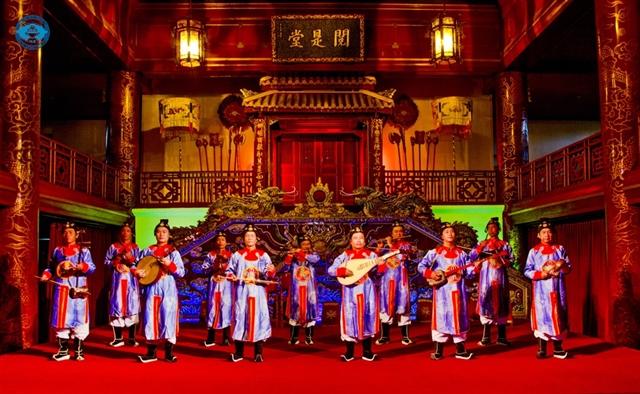 Life & Style
Life & Style

 |
| Nhã nhạc (royal court music) will be performed on June 17 at Ngọ Môn Square to celebrate the 30th anniversary of UNESCO recognition of the Complex of Huế Monuments as a site of world cultural heritage and the 20th anniversary of nhã nhạc (royal court music) being recognised as a world cultural heritage. — Photo courtesy of Huế Monuments Conservation Centre |
THỪA THIÊN-HUẾ — A ceremony will take place at Ngọ Môn Square in Huế City today to celebrate the Complex of Huế Monuments and nhã nhạc being honoured by the United Nations Educational, Scientific and Cultural Organisation (UNESCO).
This year is the 30th anniversary of UNESCO recognition of the Complex of Huế Monuments as a site of world cultural heritage and the 20th anniversary of nhã nhạc (royal court music) being recognised as a world cultural heritage.
Huế has been hailed by UNESCO as the leading Vietnamese locality in terms of heritage preservation, which turned it into a model centre for technological heritage transfer in the Asia-Pacific region, said the Director of the Huế Department of Culture and Sports.
Over the past few years, around 170 works of different sizes have been restored – most notably Ngọ Môn, Thái Hòa Palace, Hiển Lâm Các and Duyệt Thị Đường as well as the royal tombs of Kings Gia Long, Đồng Khánh, Thiệu Trị, and Tự Đức, among others.
The complex was recognised as World Heritage by UNESCO in 1993. It is the 410th heritage inscribed onto UNESCO's list and the first world cultural heritage in Việt Nam.
A traditional show entitled Di Sản Cố Đô - Trao Truyền và Hội Tụ (Ancient Huế Capital's Heritage - Transmission and Convergence) features nhã nhạc performances by artists from the Huế Royal Traditional Art Theatre.
The audience will be immersed in the sounds and colours of the cultural and artistic space within the ancient Imperial City to thoroughly enjoy Huế's intangible cultural heritage – nhã nhạc.
Nhã nhạc refers to a broad range of musical and dance styles performed at the Vietnamese royal court from the fifteenth to the mid-twentieth century. It was generally featured at the opening and closing of ceremonies associated with anniversaries, religious holidays, coronations, funerals and official receptions.
UNESCO announced its recognition of the Huế royal court music or nhã nhạc as an oral and intangible heritage of humanity in 2003.
Among the numerous musical genres that developed in Việt Nam, only nhã nhạc can claim a nationwide scope and strong links with the traditions of other East Asian countries, according to UNESCO.
“Việt Nam’s royal court music has the meaning of ‘refined music’. Among various kinds of music developed in Việt Nam, only nhã nhạc is considered the national music”, reported UNESCO Council’s evaluation.
Over the past 20 years, the staff of the Huế Monuments Conservation Centre has collected, researched and preserved dozens of important royal music works to perform during important ceremonies of the court such as the Nam Giao Ritual, the Thế Miếu Ritual, the Đoan Dương and Vạn Thọ ceremonies, Lunar New Year’s Festival and rituals for the king’s longevity.
The centre set up the Huế Royal Art Theatre, upgraded the Duyệt Thị Đường Royal Theatre while organising a range of programmes and research projects in an effort to preserve the court music.
During Huế festivals, royal art forms, especially nhã nhạc, greatly contribute to the success of the festivals and are highly appreciated by both domestic and foreign tourists. As an academic art performance, nhã nhạc has become a typical example of Huế’s culture in dialogues and exchanges with international friends.
"Over the past decades, nhã nhạc has been revived and brought into its full glory in modern life thanks to joint domestic and foreign efforts," said Lê Thị Minh Lý, deputy-chairperson of the Cultural Heritage Association of Việt Nam.
In particular, old artisans have tried their best to help raise young musicians’ awareness of heritage and have handed down their performance skills to younger generations.
There will be a number of exhibitions held in Huế City displaying royal antiquities, paintings, and the poetry of King Thiệu Trị through traditional Taiwanese calligraphy. — VNS




